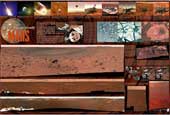
 |
|
|
|
This one is a little bit different to the usual tomes on SETI – the Search for Extraterrestrial Intelligence – that fill the bookshelves. For years sections of the SETI community have bemoaned the fact that the social sciences are often sidelined in favour of the hard sciences when it comes to SETI discussion. Civilisations Beyond Earth starts to redress the balance, edited skillfully by Douglas Vakoch, the only sociologist on staff at the SETI Institute in California, and Albert Harrison, a psychologist from the University of California, Davis. Indeed, Harrison’s chapter contained one of my favourite parts, retelling the story of how Carl Sagan managed to convince US Senator William Proxmire, who in 1978 awarded SETI his notorious ‘Golden Fleece Award’ for projects that in his eyes wasted taxpayers money, that SETI wasn’t a waste of time after all. If you’re worried this book may be full of psychobabble, don’t be. For one thing, there are healthy contributions from astronomers such as Seth Shostak and Alan Penny, as well as anthropological and archeological looks at the lifetime of civilisations and the development of biological intelligence. The middle section of the book, entitled ‘Reactions to Discovering Life Beyond Earth’ does sag a little, with chapters describing endless results from questionnaires asking what the public thinks about extraterrestrial contact lacking any solid analysis or conclusions, suggesting that the field still needs significant development in this area. Things pick up again towards the end though when the discussion moves towards actual communication, with some fascinating (and perhaps fantastical) contributions including the idea of beaming digital avatars of ourselves to meet the aliens. On the downside, the notion of sending stories told in animations of glorified stick men, as described by Harry Letaw, sounds unconvincing. For those who are familiar with SETI and who wish to take their reading on the subject in a new direction, Civilisations Beyond Earth is an brave attempt at doing something different, but with mixed results. Keith Cooper |
|
|
|
2009 Yearbook This 132-page special edition features the ultimate observing guide for 2009, a review of all the biggest news stories of 2008, in depth articles covering all aspects of astronomy and space missions for 2009, previews of International Year of Astronomy events and much, much more. This 132-page special edition features the ultimate observing guide for 2009, a review of all the biggest news stories of 2008, in depth articles covering all aspects of astronomy and space missions for 2009, previews of International Year of Astronomy events and much, much more.Infinity Rising  This special publication features the photography of British astro-imager Nik Szymanek and covers a range of photographic methods from basic to advanced. Beautiful pictures of the night sky can be obtained with a simple camera and tripod before tackling more difficult projects, such as guided astrophotography through the telescope and CCD imaging. This special publication features the photography of British astro-imager Nik Szymanek and covers a range of photographic methods from basic to advanced. Beautiful pictures of the night sky can be obtained with a simple camera and tripod before tackling more difficult projects, such as guided astrophotography through the telescope and CCD imaging.Exploring Mars  Astronomy Now is pleased to announce the publication of Exploring Mars. The very best images of Mars taken by orbiting spacecraft and NASA's Spirit and Opportunity rovers fill up the 98 glossy pages of this special edition! Astronomy Now is pleased to announce the publication of Exploring Mars. The very best images of Mars taken by orbiting spacecraft and NASA's Spirit and Opportunity rovers fill up the 98 glossy pages of this special edition!Mars rover poster  This new poster features some of the best pictures from NASA's amazing Mars Exploration Rovers Spirit and Opportunity. This new poster features some of the best pictures from NASA's amazing Mars Exploration Rovers Spirit and Opportunity. |
||||||||||||||||||||||||